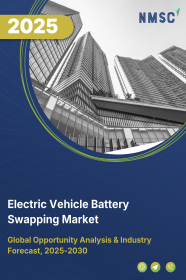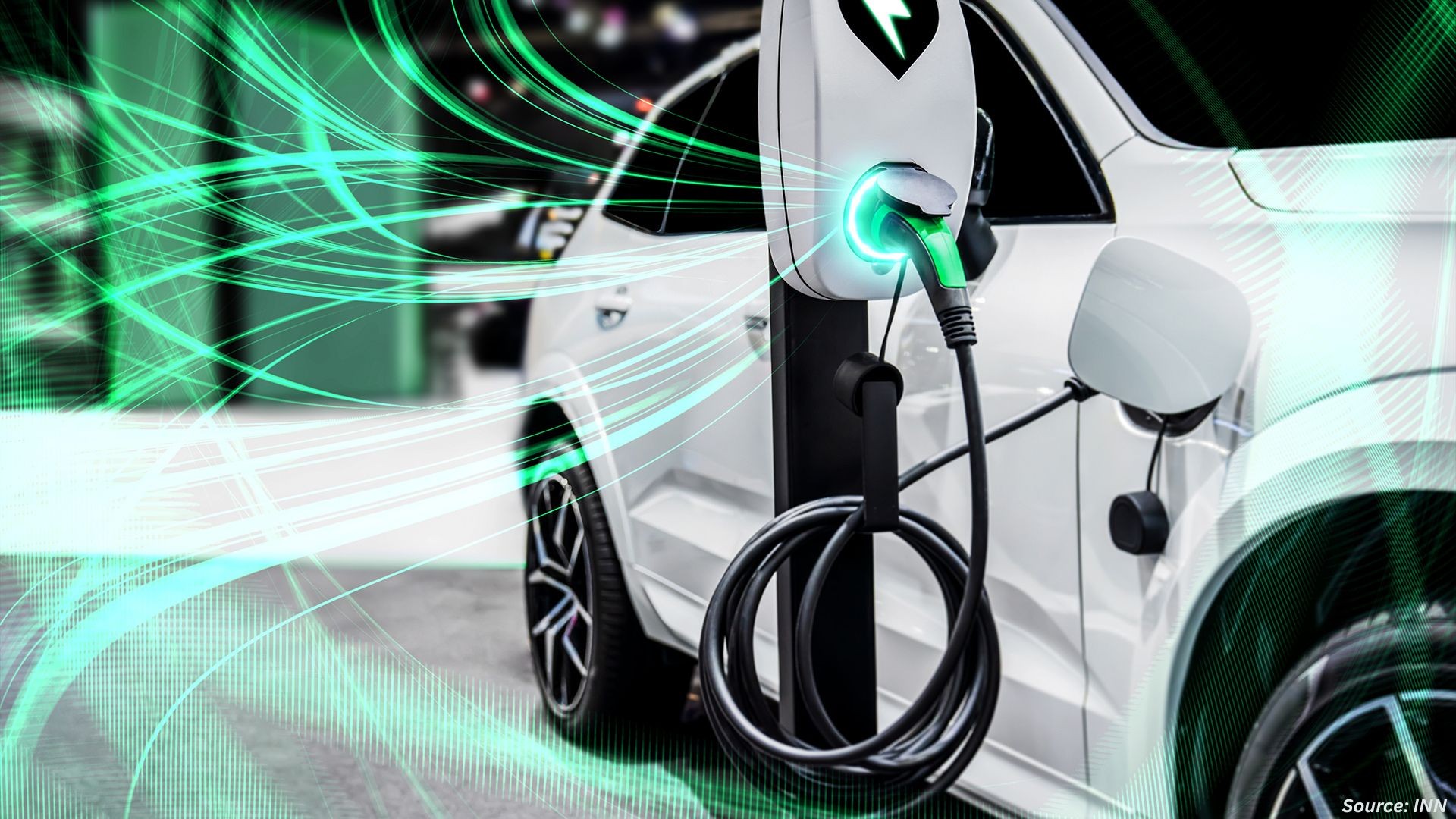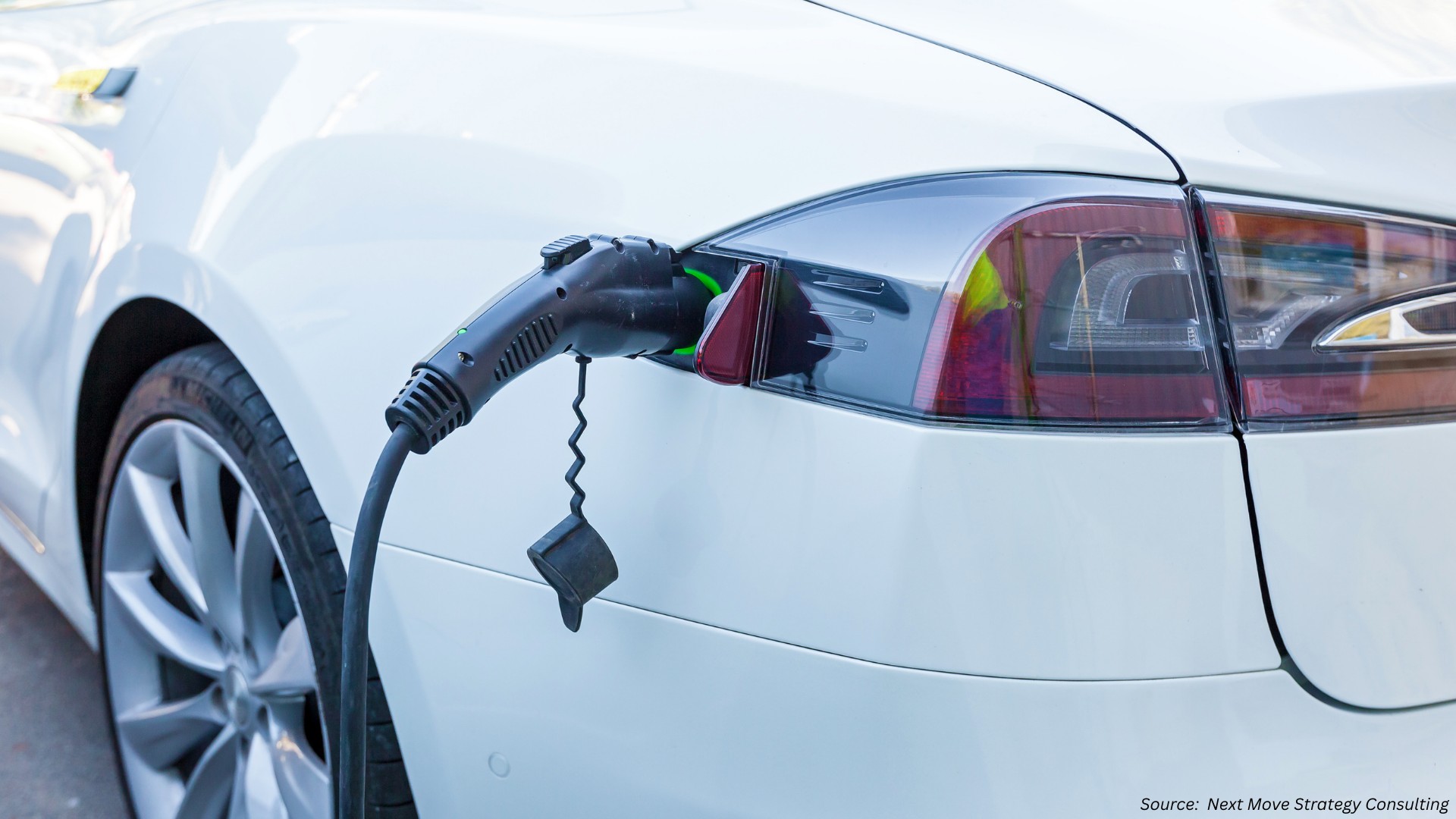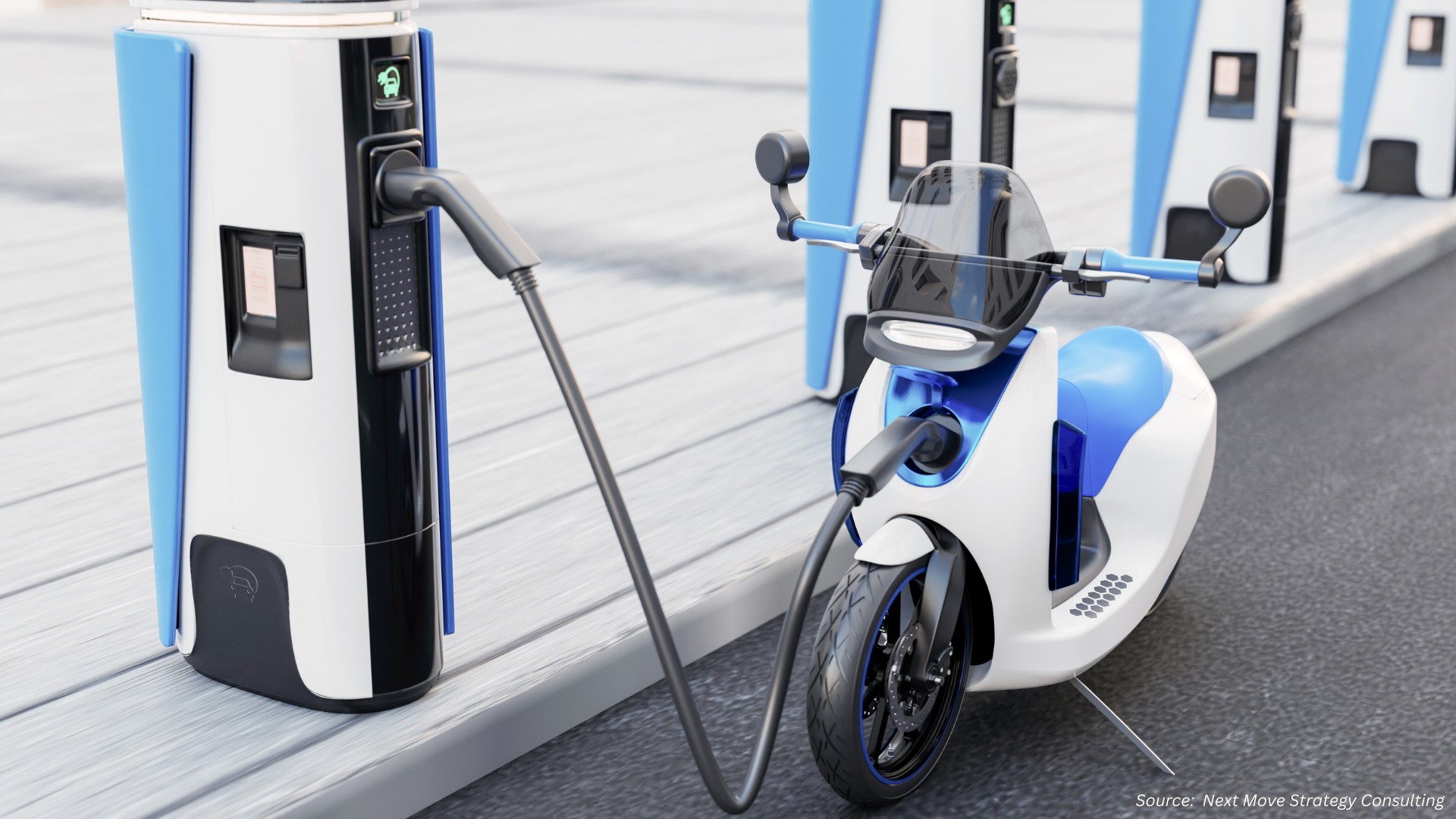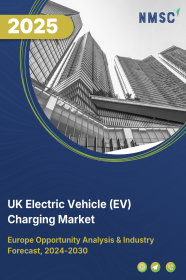
UK Electric Vehicle (EV) Charging Market by Type of Charger (AC Chargers, and DC Chargers), by Charging Speed (Level 1, Level 2, and Level 3), by Connector Type (Type 1, Type 2, CCS, CHAdeMO, and Others), by Installation (Fixed, and Portable), and by End User (Commercial, and Residential) – Opportunity Analysis and Industry Forecast 2023–2030
Industry: Automotive & Transportation | Publish Date: 19-Sep-2025 | No of Pages: 179 | No. of Tables: 142 | No. of Figures: 87 | Format: PDF | Report Code : AT849
Market Definition
UK Electric Vehicle (EV) Charging Market was valued at USD 612.42 million in 2022, and is predicted to reach USD 4986.0 million by 2030, with a CAGR of 30.7% from 2023 to 2030. Electric vehicle chargers are defined by the amount of energy delivered to the vehicle’s battery per unit of time. It is an infrastructure that is used to connect the plug-in electric vehicle to an electrical outlet to charge the battery of the vehicle. Electric vehicle chargers are used to provide charging to EVs with a battery and the electrical source that helps to charge the battery.
Electric vehicles, neighborhood EVs, and plug-in hybrids can all be charged at a charging station by connecting to an electrical source. Advanced features including smart meters, cellular connectivity, and network access are available on some charging stations.
The charging of EVs can be carried out through several levels of charging such as level 1, level 2, and level 3. The higher the level of charging, the faster the charging process causing more power to be delivered to the vehicle. The use of electric vehicles significantly reduces the carbon footprints released into the atmosphere, which contain toxic gas. The growing threat of carbon emissions and other harmful gases stemming from transportation has triggered the vital necessity of adopting electric vehicles.
In addition, the penetration of EV charging is high in commercial spaces as compared to residential ones. Long-distance trips would benefit from ultra-fast charging capabilities made possible by public charging infrastructure. However, EV chargers for residential spaces offer significant growth potential as they are affordable and more convenient for charging electric vehicles as compared to commercial charging stations.
Aggressive Government Mandates and Targeted Funding Continue to Underpin Rapid Network Growth
The UK government's legally binding commitment to achieve net-zero carbon emissions by 2050 is the foundational driver of the EV charging market. This high-level policy has been translated into concrete, industry-shaping mandates, most notably the plan to end the sale of new petrol and diesel cars by 2035. To facilitate this transition, the government has set a target of expanding the public charging network to 300,000 devices by 2030, a goal that necessitates a rapid and sustained rollout of infrastructure.
This strategic objective is backed by substantial and continuous financial support. The Local EV Infrastructure (LEVI) Fund is a cornerstone of this effort, designed to accelerate the installation of chargers, particularly on-street charging for residents without private driveways. In a clear demonstration of this policy in action, the government announced in March 2025 an allocation of £40.8 million from the LEVI fund, earmarked to install over 16,000 new charge points across England's Midlands region. This direct investment is yielding measurable progress. According to official statistics from September 2025, the UK's public charging network has been expanding steadily, with the total number of devices increasing consistently month-over-month. As of August 2025, the UK had added 2,661 new rapid or ultra-rapid chargers in 2025 alone, reflecting an 18% increase in this critical high-speed segment since the end of 2024.
Surging Consumer EV Adoption and Major Private Sector Investment Fuel Commercial Expansion
The second major driver is the powerful synergy between soaring consumer demand for EVs and the corresponding influx of private capital to build the necessary infrastructure. The UK has crossed a significant threshold in EV adoption. By July 2025, the number of fully electric cars on UK roads had surpassed 1.6 million, and EVs were consistently capturing over a fifth of the new car market. This growing fleet of EVs creates a strong and predictable revenue base for Charge Point Operators (CPOs), making the sector an attractive target for investment.
The private sector has responded with vigour, shouldering the majority of the investment in network expansion. This is particularly evident in the deployment of high-powered charging. Major players like Instavolt, Tesla Supercharger, and BP Pulse have become dominant forces in the rapid and ultra-rapid charging landscape, recognizing that fast, reliable charging is key to eliminating range anxiety and supporting long-distance travel. Their commercial-led rollout is complemented by significant investment in destination charging (e.g., at supermarkets and retail parks) by companies like Pod Point, which caters to the "top-up" charging model. This private sector-led expansion is critical for creating a competitive, innovative, and commercially sustainable market that can scale to meet the needs of millions of EV drivers.
Significant Grid Capacity Limitations and Pronounced Regional Disparities Hinder Equitable Infrastructure Rollout
Despite the positive growth trajectory, a significant restraint is the physical limitation of the UK's electricity grid and the uneven geographical distribution of charging infrastructure. The national grid was not originally designed to support the massive, localized power demands of widespread EV charging, particularly clusters of ultra-rapid chargers which can draw as much power as a small town. Consequently, securing the necessary grid connections for new charging hubs can be a complex, costly, and time-consuming process, often involving significant upgrades to local substations and cabling. This can create long lead times for new installations and add substantial costs, acting as a brake on rapid deployment.
This technical challenge is exacerbated by a stark regional imbalance, often termed an "infrastructure postcode lottery". As of 2025, charging provision remains heavily concentrated in London and the South East of England, while many rural and less affluent regions lag far behind. This disparity creates a two-tier system where drivers in well-served areas enjoy easy access to charging, while those in "charging blackspots" face significant barriers to EV ownership. This uneven rollout not only risks excluding entire communities from the EV transition but also undermines the national goal of creating a truly comprehensive and equitable charging network.
Advanced Smart Charging Technologies and Vehicle-to-Grid (V2G) Integration Offer New Revenue and Grid-Balancing Capabilities
A major emerging opportunity for the UK EV charging market lies in the transition from a simple energy-dispensing model to a sophisticated, integrated energy services model. This is being enabled by the rapid development of smart charging and Vehicle-to-Grid (V2G) technologies.
Smart charging allows the charging process to be intelligently managed. Instead of charging at a fixed, high rate as soon as a vehicle is plugged in, a smart charger can adjust the charging speed based on external signals. This could mean automatically charging during off-peak hours when electricity is cheapest and greenest, or responding to signals from the grid operator to reduce load during periods of high national demand. This provides direct cost savings for the EV owner and turns the vehicle into a flexible asset that can help stabilize the power grid.
Vehicle-to-Grid (V2G) technology takes this concept a step further. It enables bidirectional energy flow, allowing a parked EV to not only draw power from the grid but also to discharge stored energy from its battery back into the grid when needed. This creates a vast, distributed network of mobile batteries that can act as a virtual power plant. For the grid operator, this provides a critical source of flexibility to balance supply and demand, especially with the increasing intermittency of renewable energy sources like wind and solar. For the EV owner, it opens up new revenue streams through participation in energy markets, allowing them to be paid for providing valuable grid services. As the UK continues to invest in its smart grid infrastructure, the integration of V2G-capable chargers represents a transformative opportunity to enhance grid resilience, reduce energy costs, and create new value propositions for the entire EV ecosystem.
Competitive Landscape
The UK Electric Vehicle (EV) Charging industry includes several market players such as EVBox, Hypervolt Inc., BP Pulse, Schneider Electric, Siemens, Tesla, ABB Ltd., Pod Point, MFG EV Power, Wallbox Inc., InstaVolt, Shell Recharge, Gridserve, RAW Charging, Fastned UK, and others.
Key Benefits
-
The UK Electric Vehicle (EV) Charging market report provides a quantitative analysis of the current market and estimations through 2023-2030 that assists in identifying the prevailing market opportunities to capitalize on.
-
The study comprises a deep dive analysis of the market trend including the current and future trends for depicting the prevalent investment pockets in the market.
-
The information related to key drivers, restraints, and opportunities and their impact on the market is provided in the report.
-
The competitive analysis of the market players along with their market share in the UK Electric Vehicle (EV) Charging market.
-
The SWOT analysis and Porter’s Five Forces model are elaborated in the study.
-
Value chain analysis in the market study provides a clear picture of the stakeholders’ roles.
UK Electric Vehicle (EV) Charging Market Key Segments
By Type of Charger
-
AC Chargers
-
Mode 1 (2.3 kW)
-
Mode 2 (2.3 kW)
-
Mode 3 (3.7 kW to 22 kW)
-
-
DC Chargers (22 kW to 350 kW)
By Charging Speed
-
Level 1
-
Level 2
-
Level 3
By Connector Type
-
Type 1
-
Type 2
-
CCS
-
CHAdeMO
-
Others
By Installation
-
Fixed
-
Portable
By End User
-
Commercial
-
Commercial Public EV Charging Stations
-
Highway Charging Stations
-
Fleet Charging Stations
-
Workplace Charging Stations
-
-
Commercial Private EV Charging Stations
-
-
Residential
-
Private Homes
-
Apartments
-
Key Players
-
EVBox
-
Hypervolt Inc.
-
BP Pulse
-
Schneider Electric
-
Siemens
-
Tesla
-
ABB Ltd.
-
Pod Point
-
MFG EV Power
-
Wallbox Inc.
-
InstaVolt
-
Shell Recharge
-
Gridserve
-
RAW Charging
-
Fastned UK
Report Scope and Segmentation
|
Parameters |
Details |
|
Market Size in 2022 |
USD 612.42 Million |
|
Market Volume in 2022 |
56 Thousand Units |
|
Revenue Forecast in 2030 |
USD 4986.0 Million |
|
Growth Rate |
CAGR of 30.7% from 2023 to 2030 |
|
Analysis Period |
2022–2030 |
|
Base Year Considered |
2022 |
|
Forecast Period |
2023–2030 |
|
Market Size Estimation |
Million (USD) |
|
Growth Factors |
Aggressive Government Mandates and Targeted Funding Continue to Underpin Rapid Network Growth. Surging Consumer EV Adoption and Major Private Sector Investment Fuel Commercial Expansion. |
|
Companies Profiled |
15 |
|
Market Share |
Available for 10 companies |
|
Customization Scope |
Free customization (equivalent up to 80 working hours of analysts) after purchase. Addition or alteration to country, regional, and segment scope. |
|
Pricing and Purchase Options |
Avail customized purchase options to meet your exact research needs. |

















 Speak to Our Analyst
Speak to Our Analyst




